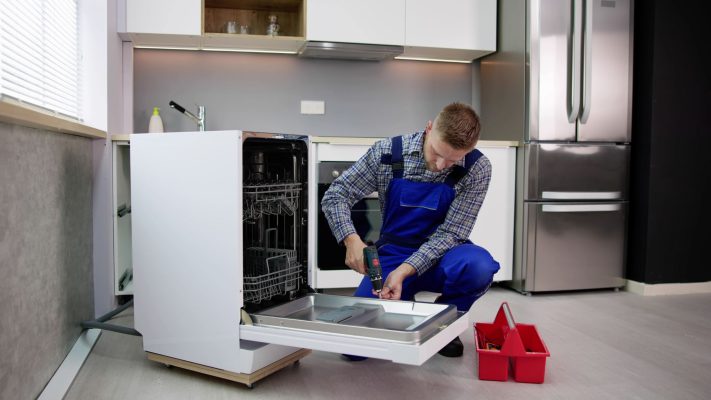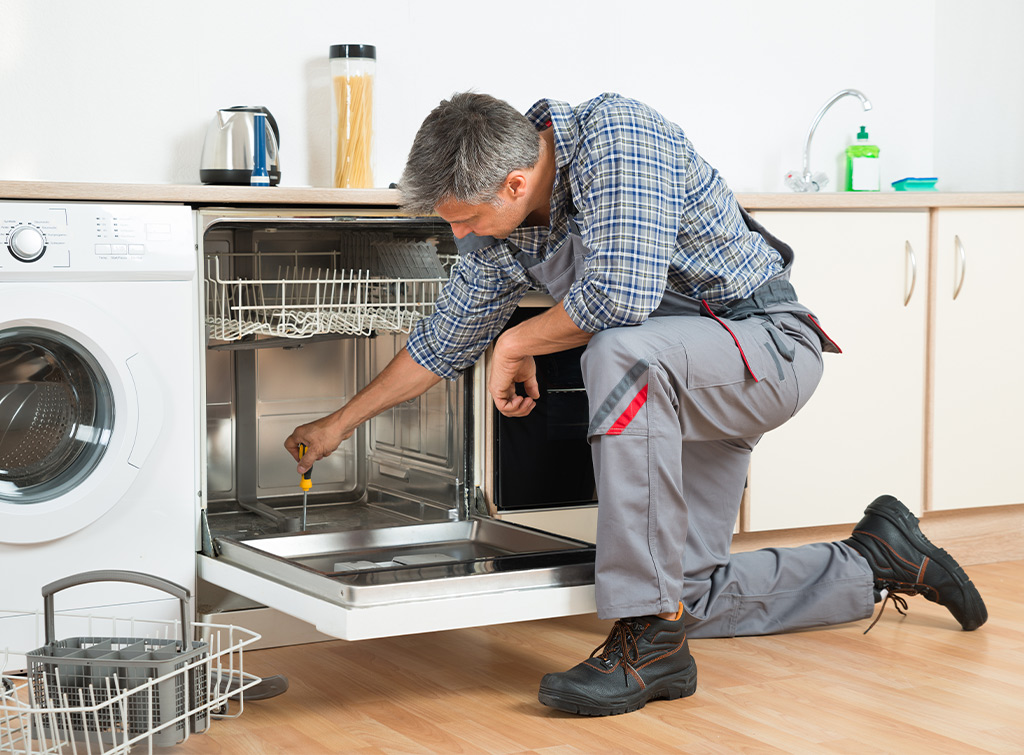Home appliances are an integral part of daily life, making everything from laundry to meal preparation easier and more efficient. However, like any mechanical device, appliances can wear down over time, leading to costly repairs or even the need for replacement. The good news is that with regular maintenance, many common problems can be prevented, allowing your appliances to run efficiently and extending their lifespan.
Proper maintenance not only helps avoid expensive repairs but also improves the energy efficiency of your appliances, saving you money on utility bills. In this guide, we’ll explore the best practices for maintaining various household appliances to keep them in peak condition.
Clean Refrigerator Coils Regularly
Refrigerators are among the hardest-working appliances in your home, running 24/7 to keep food fresh. One of the most overlooked maintenance tasks for refrigerators is cleaning the condenser coils. These coils, located either behind or beneath the fridge, can accumulate dust and debris over time, causing the refrigerator to work harder to maintain the proper temperature. This additional strain can lead to a breakdown if not addressed.
To maintain your refrigerator and avoid costly repairs, make it a habit to clean the coils at least twice a year. You can use a vacuum cleaner or a coil cleaning brush to remove dust buildup. Be sure to unplug the refrigerator before performing any cleaning to avoid electrical hazards.
In addition to cleaning the coils, check the door seals (gaskets) for any cracks or wear. Damaged seals can allow cold air to escape, causing the fridge to run more often and increasing your energy bills. If you notice worn seals, replace them promptly to keep your refrigerator running efficiently.

Replace Washing Machine Hoses
Washing machines are prone to water leaks, especially if the hoses that supply water become worn or damaged. Over time, rubber hoses can weaken and crack, leading to leaks that can cause significant water damage to your home. To avoid such issues, it’s essential to inspect the hoses regularly for any signs of wear or bulging.
A good rule of thumb is to replace your washing machine hoses every three to five years, even if they appear to be in good condition. For added durability, consider using stainless steel braided hoses, which are more resistant to wear and tear than rubber ones.
In addition to checking the hoses, avoid overloading your washing machine, as this can put undue strain on the motor and other components. Following the manufacturer’s recommendations for load size will help your washing machine perform optimally and last longer.
Clean the Lint Filter in Your Dryer After Every Use
Dryers are another appliance that requires regular maintenance to avoid serious problems. One of the most important tasks you can perform is cleaning the lint filter after every use. A clogged lint filter not only reduces your dryer’s efficiency but also increases the risk of a fire. In fact, lint buildup is one of the leading causes of dryer-related house fires.
In addition to cleaning the lint filter, inspect and clean the dryer vent at least once a year. Over time, lint can accumulate in the vent and restrict airflow, making your dryer work harder and increasing the risk of overheating. Use a vacuum or vent cleaning kit to remove any lint or debris from the vent hose and duct.
If you notice that your clothes take longer than usual to dry or the dryer feels unusually hot, these could be signs of a clogged vent. Address the issue promptly to avoid damaging the appliance and potentially causing a fire.
Check the Dishwasher Filter and Spray Arms
Dishwashers make cleaning up after meals much easier, but they need regular maintenance to continue operating efficiently. One common issue with dishwashers is poor cleaning performance, which can often be traced back to a clogged filter or blocked spray arms.
To keep your dishwasher running smoothly, clean the filter at least once a month. The filter is typically located at the bottom of the dishwasher and is designed to trap food particles and debris. If the filter becomes clogged, it can prevent water from circulating properly, leading to dirty dishes.
The spray arms, which distribute water throughout the dishwasher, should also be inspected regularly. Food particles or mineral deposits can clog the small holes in the spray arms, reducing water flow and cleaning effectiveness. Remove the spray arms and rinse them under running water to clear any blockages.
In addition to cleaning the filter and spray arms, run an empty dishwasher cycle with a cup of white vinegar every few months to help remove any buildup of grease or mineral deposits inside the machine.

Keep the Oven and Stovetop Clean
Ovens and stovetops are essential for preparing meals, but they can accumulate grease and food particles over time, which can affect their performance and even become a fire hazard. Regular cleaning is key to maintaining your oven and stovetop in good working condition.
For gas stovetops, make sure the burners are clean and free of debris. If the burners are clogged with food particles or grease, they may not ignite properly or produce an uneven flame. You can clean the burners with a mixture of warm water and dish soap, using a brush to remove stubborn residue.
Electric stovetops also benefit from regular cleaning. Wipe down the surface after each use to prevent food buildup and stains. For stubborn stains, use a gentle stovetop cleaner to avoid damaging the surface.
Your oven’s performance can also be affected by grease and food spills. Regularly clean the inside of the oven with a non-abrasive cleaner to remove grease and grime. If your oven has a self-cleaning function, use it periodically to burn off any residue.
Maintaining a clean oven and stovetop will not only improve their efficiency but also reduce the risk of smoke and unpleasant odors when cooking.
Defrost the Freezer
If your freezer doesn’t have an automatic defrost function, it’s important to manually defrost it when frost buildup becomes noticeable. Too much frost can reduce the efficiency of the freezer, making it work harder to maintain the proper temperature.
To defrost the freezer, unplug the appliance and remove all food items. Allow the ice to melt naturally or speed up the process by placing bowls of hot water inside the freezer. Once the ice has melted, wipe down the interior and dry it thoroughly before plugging the freezer back in.
Keeping your freezer frost-free will help it run more efficiently and prevent unnecessary wear on the compressor.
Inspect and Clean the Air Conditioner Filters
Air conditioners, whether window units or central systems, require regular maintenance to function efficiently. One of the most important tasks is cleaning or replacing the air filter, which traps dust, dirt, and allergens from the air.
A clogged air filter reduces airflow, causing the air conditioner to work harder and increasing energy consumption. It can also lead to frozen coils, poor cooling performance, and even system breakdowns.
Check the air filter at least once a month during the cooling season and clean or replace it as needed. Some filters are washable, while others need to be replaced. Following the manufacturer’s recommendations for filter maintenance will help keep your air conditioner running smoothly and extend its lifespan.
In addition to cleaning the filter, inspect the condenser coils and evaporator fins for dirt and debris. If these components are dirty, they can reduce the efficiency of the unit. Clean them with a soft brush or vacuum to ensure proper airflow.
Check Water Heater Maintenance
Your water heater is another appliance that benefits from regular maintenance. Over time, sediment can accumulate at the bottom of the tank, reducing the heater’s efficiency and potentially causing damage.
To maintain your water heater, drain a few gallons of water from the tank every six months to remove any sediment. This simple task can improve the efficiency of the heater and extend its life. If you have a gas water heater, also check the burner and pilot light for proper operation.
In areas with hard water, consider installing a water softener to reduce mineral buildup in your water heater and other appliances.
By performing regular maintenance on your water heater, you can prevent costly repairs and ensure a steady supply of hot water.
Routine Inspections Can Prevent Major Repairs
While many maintenance tasks can be done by homeowners, it’s also a good idea to schedule routine professional inspections for certain appliances, such as your HVAC system and water heater. Professional technicians can identify potential problems before they turn into costly repairs.
Scheduling annual maintenance checks for appliances like your furnace, air conditioner, and water heater can keep them running efficiently and help you avoid unexpected breakdowns.
Regular maintenance is the key to keeping your home appliances running smoothly and efficiently for years to come. By taking the time to perform these simple tasks, you can avoid expensive repairs and extend the life of your appliances, saving money in the long run.

Please read more articles, this is the content you need:
DIY HVAC Repairs: What You Should and Shouldn’t Do
Your HVAC (Heating, Ventilation, and Air Conditioning) system is essential for maintaining a comfortable indoor [...]
Sep
Top Appliance Repair Tools Every Homeowner Should Have
In today’s fast-paced world, the ability to handle minor repairs around the home can save [...]
Sep
How to Maintain Your Appliances to Avoid Expensive Repairs
Home appliances are an integral part of daily life, making everything from laundry to meal [...]
Sep
The Importance of Regular Maintenance in Preventing HVAC Repairs
Heating, ventilation, and air conditioning (HVAC) systems are vital for maintaining comfortable indoor environments year-round. [...]
Sep